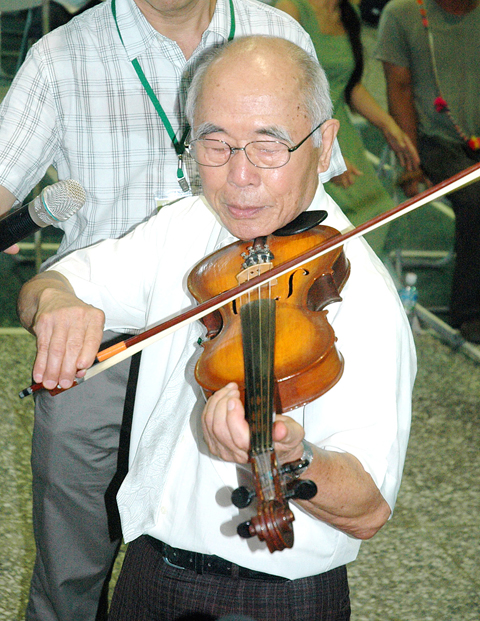Wang Wen-ching (王文清), an 83-year-old former political prisoner, sighed as he recalled the years he spent in the Green Island prison after being convicted for no reason in the 1950s.
He said the one thing that made him proud was the violin he pieced together from whatever materials he could get hold of, and that kept him company during his 15 years behind bars.
Wang was born under Japanese rule and worked for the post office. When the Chinese Nationalist Party (KMT) took over Taiwan in 1945, the Japanese language was banned, and people had to attend classes in Mandarin Chinese. When Wang was 23, his Mandarin teacher was accused of being a communist spy. All 34 students in Wang’s class were found guilty by association and sentenced to 15 years in Green Island Prison without even being questioned.

PHOTO: CNA
One of Wang’s fellow prisoners had a violin that started to rot in the damp conditions. The moldy fiddle seemed symbolic of the prisoners’ own sorry condition, and Wang decided to give it a new life. Wang, who knew nothing about music, said he borrowed the old violin and examined its structure. Then, through the prison shop, he had some juniper wood, bowstring and a wooden hoe handle brought over from Taiwan proper. Wang said it took him a whole month to fashion the hoe handle into a bow.
Lacking tools, Wang gathered washed-up glass from the beach to make implements for sawing, gouging and sanding. To give the wooden parts the required curves and contours, he got access to the kitchen and heated them over a stove.
It took him six months to finish the instrument, Wang said, adding that then he got hold of a Japanese violin music book and went to practice in the pigsty, where his amateurish playing would not disturb the other inmates.
At the end of his sentence, Wang took his precious violin home, where it gathered dust for more than 40 years before he took it out of its case two years ago and restored it to its original condition.

An essay competition jointly organized by a local writing society and a publisher affiliated with the Chinese Communist Party (CCP) might have contravened the Act Governing Relations Between the People of the Taiwan Area and the Mainland Area (臺灣地區與大陸地區人民關係條例), the Mainland Affairs Council (MAC) said on Thursday. “In this case, the partner organization is clearly an agency under the CCP’s Fujian Provincial Committee,” MAC Deputy Minister and spokesperson Liang Wen-chieh (梁文傑) said at a news briefing in Taipei. “It also involves bringing Taiwanese students to China with all-expenses-paid arrangements to attend award ceremonies and camps,” Liang said. Those two “characteristics” are typically sufficient

A magnitude 5.9 earthquake that struck about 33km off the coast of Hualien City was the "main shock" in a series of quakes in the area, with aftershocks expected over the next three days, the Central Weather Administration (CWA) said yesterday. Prior to the magnitude 5.9 quake shaking most of Taiwan at 6:53pm yesterday, six other earthquakes stronger than a magnitude of 4, starting with a magnitude 5.5 quake at 6:09pm, occurred in the area. CWA Seismological Center Director Wu Chien-fu (吳健富) confirmed that the quakes were all part of the same series and that the magnitude 5.5 temblor was

The brilliant blue waters, thick foliage and bucolic atmosphere on this seemingly idyllic archipelago deep in the Pacific Ocean belie the key role it now plays in a titanic geopolitical struggle. Palau is again on the front line as China, and the US and its allies prepare their forces in an intensifying contest for control over the Asia-Pacific region. The democratic nation of just 17,000 people hosts US-controlled airstrips and soon-to-be-completed radar installations that the US military describes as “critical” to monitoring vast swathes of water and airspace. It is also a key piece of the second island chain, a string of

The Central Weather Administration has issued a heat alert for southeastern Taiwan, warning of temperatures as high as 36°C today, while alerting some coastal areas of strong winds later in the day. Kaohsiung’s Neimen District (內門) and Pingtung County’s Neipu Township (內埔) are under an orange heat alert, which warns of temperatures as high as 36°C for three consecutive days, the CWA said, citing southwest winds. The heat would also extend to Tainan’s Nansi (楠西) and Yujing (玉井) districts, as well as Pingtung’s Gaoshu (高樹), Yanpu (鹽埔) and Majia (瑪家) townships, it said, forecasting highs of up to 36°C in those areas